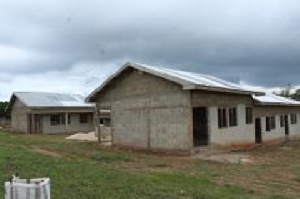A 6-unit classroom block partly financed with oil money at the Agogo District Assembly Savior School complex cannot be traced even though completion of the project has been captured in the Annual Budget Funding Amount (ABFA), investigations conducted by the New Crusading GUIDE has revealed.
This follows attempts by members of the Public Interest and Accountability Committee (PIAC), together with members of the Institute of Finance and Economic Journalists (IFEJ), to monitor projects in the District listed to have been undertaken with money from the oil revenue.
According to PIAC’s report, over GHS14 million was invested in the construction of 127 six-unit classroom blocks, between 2011 to 2016; out of the GHS70.9 million of the oil revenue that is stated to have been spent on educational infrastructure across the country.
But local authorities at the Asante Akyem North District could not establish oil funded projects in the Agogo area, including the 6-unit classroom block which had been listed to have been funded, partly with oil money.
The District Coordinating Director, Mr. Anthony Kwanin, interacting with members of PIAC, lamented the lack of involvement of local authorities in the award and supervision of some of these projects.
He explained that their lack of involvement made it difficult to do any monitoring or supervision of any sort saying, “We often become aware of the projects when some of the contractors have issues with community members and require our assistance to resolve the situation”.
The Director of Education at the District, Mr. Ernest Kwadwo Afari, in an interview said his office was unaware of any such project or had records to show on the project, and also raised similar concerns that they are not put on notice of projects they even benefit from.
It was revealed that, normally, the provision of infrastructural facilities for pre-tertiary institutions is the responsibility of the central government through the district assemblies.
However, it was established that local assemblies, over the years, have raised issues that when projects are awarded from the central government level the district offices are often not furnished with any of the details of the contract.
Mr. Kwadwo Afari said the education office is not “informed at all of any details of projects awarded” from Accra until maybe when the project is being handed over when they are called to be part and take over the project.
“We only see that there are projects ongoing in schools but as to the details of the project we may only get to know about the project when it is handed over.”
Asked if he was aware of the construction of a 6-unit classroom block at Agogo Savior Primary School, he said “I have seen a project ongoing at the D/A Savior Schools, which is about 70 to 80 percent complete but I do not have any details to confirm if that is the said oil funded project. I don’t have any document on where the project came from, the contractor, the consultant involved, the source of funding and the others.”
He explained that education office had no role in the supervision of the construction of educational facilities except to write to the local assembly or the relevant agencies for help in the event of any defects or damage to such buildings.
But he added that they are made aware and often involved in projects funded by the District Assembly.
Meanwhile, according to some PIAC officials, request for details on the project from the Ministry of Education was disregarded while the Ministry of Finance could only state that GHS87, 424.21 was allocated through the ABFA to the project.
A member of PIAC, Dr. Nyarko-Otoo, said the lack of information and involvement of people at the local level in the award and execution of such projects makes the people ineffective to track or monitor to ensure the right thing is being done.
The situation, he said, deterred the efforts of accountability institutions, like PIAC and the others, to track projects executed with oil money. He wished the Ministries would be detailed in their reports in order to assist the work of PIAC.
General News of Friday, 25 August 2017
Source: New Crusading Guide

















